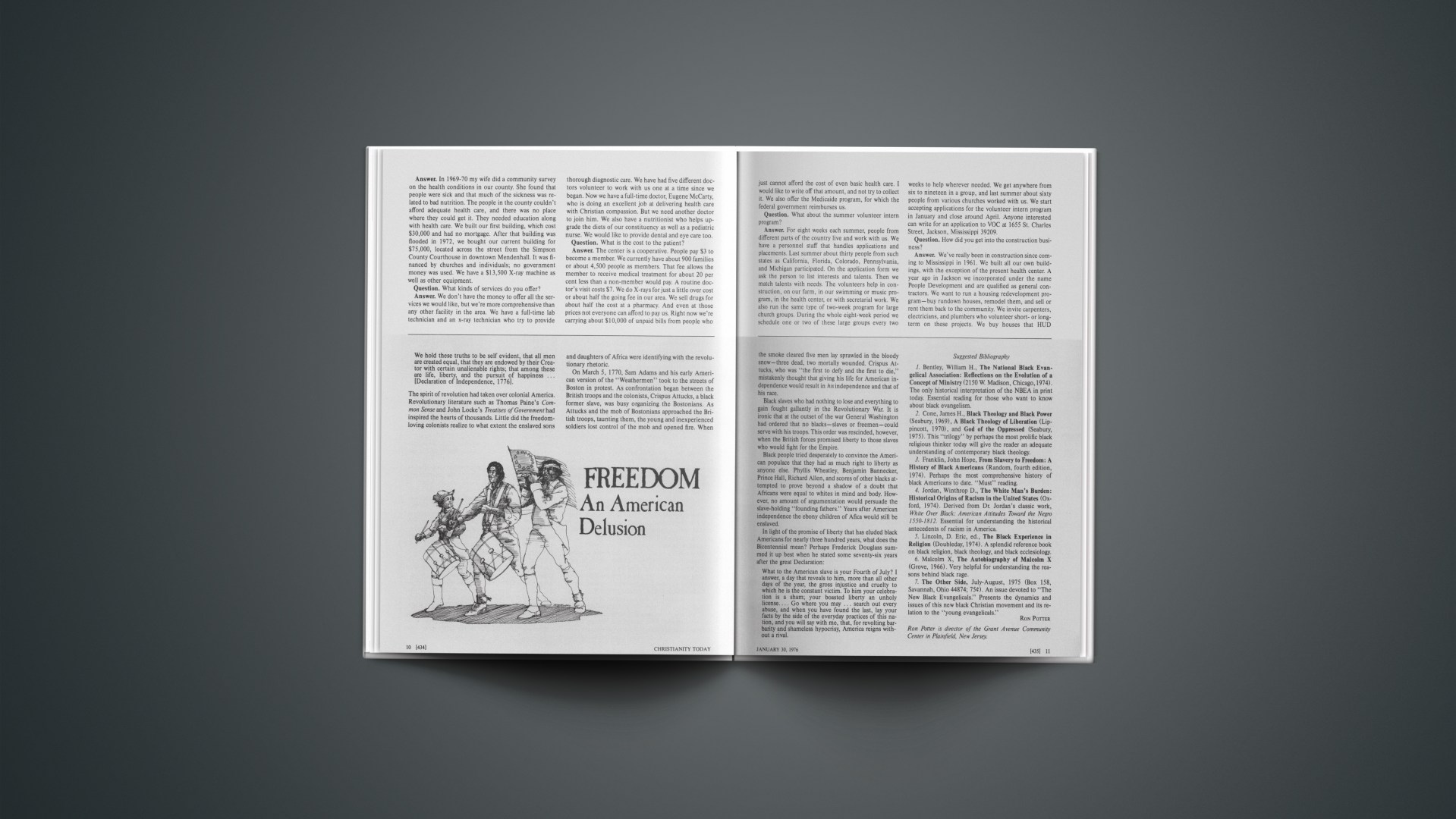We hold these truths to be self evident, that all men are created equal, that they are endowed by their Creator with certain unalienable rights; that among these are life, liberty, and the pursuit of happiness … [Declaration of Independence, 1776].
The spirit of revolution had taken over colonial America. Revolutionary literature such as Thomas Paine’s Common Sense and John Locke’s Treatises of Government had inspired the hearts of thousands. Little did the freedom-loving colonists realize to what extent the enslaved sons and daughters of Africa were identifying with the revolutionary rhetoric.
On March 5, 1770, Sam Adams and his early American version of the “Weathermen” took to the streets of Boston in protest. As confrontation began between the British troops and the colonists, Crispus Attucks, a black former slave, was busy organizing the Bostonians. As Attucks and the mob of Bostonians approached the British troops, taunting them, the young and inexperienced soldiers lost control of the mob and opened fire. When the smoke cleared five men lay sprawled in the bloody snow—three dead, two mortally wounded. Crispus Attucks, who was “the first to defy and the first to die,” mistakenly thought that giving his life for American independence would result in his independence and that of his race.
Black slaves who had nothing to lose and everything to gain fought gallantly in the Revolutionary War. It is ironic that at the outset of the war General Washington had ordered that no blacks—slaves or freemen—could serve with his troops. This order was rescinded, however, when the British forces promised liberty to those slaves who would fight for the Empire.
Black people tried desperately to convince the American populace that they had as much right to liberty as anyone else. Phyllis Wheatley, Benjamin Bannecker, Prince Hall, Richard Allen, and scores of other blacks attempted to prove beyond a shadow of a doubt that Africans were equal to whites in mind and body. However, no amount of argumentation would persuade the slave-holding “founding fathers.” Years after American independence the ebony children of Africa would still be enslaved.
In light of the promise of liberty that has eluded black Americans for nearly three hundred years, what does the Bicentennial mean? Perhaps Frederick Douglass summed it up best when he stated some seventy-six years after the great Declaration:
What to the American slave is your Fourth of July? I answer, a day that reveals to him, more than all other days of the year, the gross injustice and cruelty to which he is the constant victim. To him your celebration is a sham; your boasted liberty an unholy license.… Go where you may … search out every abuse, and when you have found the last, lay your facts by the side of the everyday practices of this nation, and you will say with me, that, for revolting barbarity and shameless hypocrisy, America reigns without a rival.
Suggested Bibliography
1. Bentley, William H., The National Black Evangelical Association: Reflections on the Evolution of a Concept of Ministry (2150 W. Madison, Chicago, 1974). The only historical interpretation of the NBEA in print today. Essential reading for those who want to know about black evangelism.
2. Cone, James H., Black Theology and Black Power (Seabury, 1969), A Black Theology of Liberation (Lippincott, 1970), and God of the Oppressed (Seabury, 1975). This “trilogy” by perhaps the most prolific black religious thinker today will give the reader an adequate understanding of contemporary black theology.
3. Franklin, John Hope, From Slavery to Freedom: A History of Black Americans (Random, fourth edition, 1974). Perhaps the most comprehensive history of black Americans to date. “Must” reading.
4. Jordan, Winthrop D., The White Man’s Burden: Historical Origins of Racism in the United States (Oxford, 1974). Derived from Dr. Jordan’s classic work, White Over Black: American Attitudes Toward the Negro 1550–1812. Essential for understanding the historical antecedents of racism in America.
5. Lincoln, D. Eric, ed., The Black Experience in Religion (Doubleday, 1974). A splendid reference book on black religion, black theology, and black ecclesiology.
6. Malcolm X, The Autobiography of Malcolm X (Grove, 1966). Very helpful for understanding the reasons behind black rage.
7. The Other Side, July-August, 1975 (Box 158, Savannah, Ohio 44874; 75¢). An issue devoted to “The New Black Evangelicals.” Presents the dynamics and issues of this new black Christian movement and its relation to the “young evangelicals.”
Ron Potter is director of the Grant Avenue Community Center in Plainfield, New Jersey.










